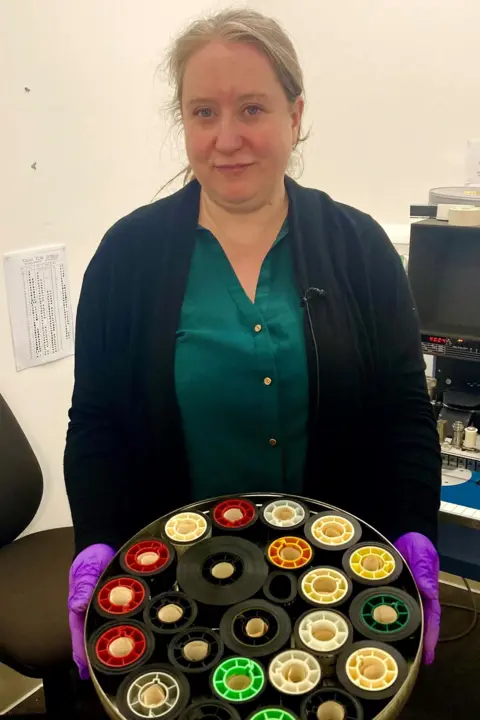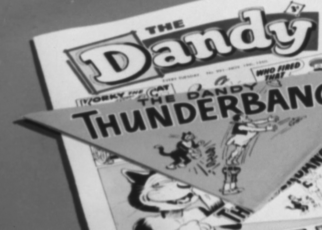[ad_1]
 DC Thomson/National Libraries of Scotland
DC Thomson/National Libraries of ScotlandA collection of TV adverts for comics and magazines like the Dandy, Bunty and Jackie are being shared online, more than half a century after they were made.
The 99 films were found in the basement of a building in Dundee owned by publisher DC Thomson.
DC Thomson used the ads to persuade readers to become regulars. Free gifts were common across all their titles.
A record of social history of the time, they also offer insight into the early days of commercial television advertising. The films – which date back to the 1950s and 60s – were discovered still in their cans.
Thanks to a partnership between DC Thomson and the National Library of Scotland (NLS), they have been restored and digitised and can be seen online at the Moving Image Archive.
Launched at the height of Beatlemania in the 1960s, Jackie magazine was the first to target young teens.
For just sixpence, it offered fashion, beauty tips and pop pinups – a young Cliff Richard was the first cover photo.
DC Thomson launched a high-profile advertising campaign to secure as many young readers as possible.
“It would have been filmed in London, but overseen from Dundee,” says DC Thomson archivist Barry Sullivan.
He discovered the Jackie advert and close to a hundred other films in a storage basement.
“When we stumbled across them it was quite a find,” he says.
“But we didn’t know how much of a find because some of the canisters couldn’t be opened.
“They were rusted shut and the ones we could open looked so delicate that we realised we were not best placed to look after them.”
So DC Thomson approached the NLS Moving Image archive.

Barry says: “We brought the films down in 2022 and later that year, we were invited back to see some of them being run through the Steenbeck editing machine.
“It was fascinating, to see these films for the first time in 50 or 60 years.”
Kay Foubister, the acquisition curator at the moving image archive, says it’s an important addition to their existing collection.
“It’s highly unusual to get a complete set of adverts, especially from the early days of commercial television,” she says.
“It only really began in Scotland in 1957 so to have a collection of ads relating to all these titles that we all know, and all had in our households, is fantastic.
“I grew up with The Bunty, my mother got My Weekly and my granny got The People’s Friend. And now we have adverts for them all.“
While TV advertising might have been in its infancy, DC Thomson had connections with some of the biggest names in the business, including Mather and Crowther, whose founder James Ogilvie would go on to inspire the TV series Mad Men.
While Jackie’s advert features a pop soundtrack and flashy images, a 1950s ad for the Dandy has a cast of actors playing teachers, policemen and excited children.
“The children’s ads do give an insight into what they were playing with and how they were selling their magazines,” says Barry.
“But it’s the women’s titles which are most interesting because they show the way things change and the way television advertising evolves along with it.”
Free gifts were an important part of the offer. They had to be small, lightweight and easy to attach to the magazine.
“They were often interchangeable,” says Kay Foubister.
“Rings for the girls could be Elvis or rosebud according to the age group. The boys were more likely to get things related to cars or football.”
Or in the case of readers of the Dandy – a Thunderbang, a noisy paper toy which is demonstrated in one of the ads.

Bunty, a weekly comic for girls under 14, had the added appeal of a back cover which featured a cut out doll with paper clothes which could be attached.
Its most popular story was The Four Marys, drawn by Barrie Mitchell, which appeared from its creation in 1958 to its end in 2001.
A quintessential English boarding school story, it was also a nod to DC Thomson’s Scottish base, and the ladies in waiting of Mary Queen of Scots.
Whether it was the ads or the gifts, the comics were hugely successful. The Dandy first broke the one million mark in 1945 but by April 1950, sales were over two million. It was also the first title to issue a Christmas annual.
Jackie went on to sell over a million issues a week.
The adverts date back to a time when people bought their favourite publications from a newsagent on a particular day of the week.
That era has gone, as have most of the publications advertised.
Jackie printed its last edition in 1993 but it lives on in a number of the adverts which have now been digitised and can be viewed online at the NLS Moving Image Archive or in person at the archive in Glasgow’s Kelvin Hall.
[ad_2]
Source link freeslots dinogame telegram营销




